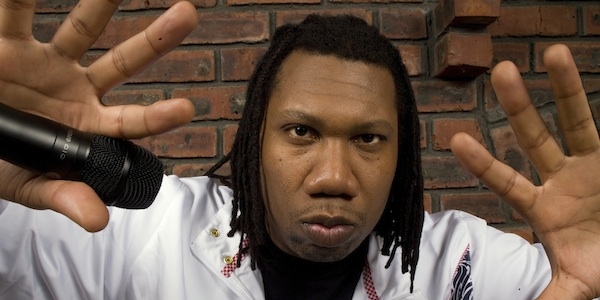Yes if you had a nice, packaged ‘hip hop artist’ stereotype, you need look no further than KRS-One to shatter that into a million pieces. A pioneering artist of the hip hop movement, ‘The Teacha’ was the first who argued that “rap is something we do; hip hop is something we live”. Due to grace our shores in early March, I speak with KRS-One to talk about rap and hip hop, his philosophies and why the hell he is getting on a long-ass boat ride to come visit us Aussies.
“When I come to Australia, lives will change,” KRS-One states. “I’m trying to walk around, drive, talk and shake hands…I want to see people. I’m coming as an anthropologist…[I want to]…raid the museums…I gotta find out what’s going on. When Obama went to Australia on the news I saw smiley faces and shaking hands. There was no real meat, no depth.”
His concern with understanding the social and cultural dimensions of a nation is not new for KRS-One (the acronym stands for Knowledge Reigning Supreme). In addition to lecturing at over 500 universities in the United States and publishing three ground-breaking books; KRS-One has also established the Stop The Violence Movement, influenced the creation of the West-Coast All-Star anti-gang anthem We’re All In The Same Gang, established hip hop as an international culture at the United Nations (2001) and has developed the Temple of Hip Hop for the spiritual exploration of hip hop’s culture.
“Hip hop is vibrant in Australia,” KRS-One explains. “They’re doing it and practicing it, so I thought to myself, ‘Hell yeah I’m coming to Australia.’ What I’m going to bring is nothing less than perfection. I want to show how to practice the [hip hop] culture without getting hurt and seeing real benefit. [I want to teach]…strategies to show how you can lift yourself out of [any] situation. But my personal reasons for visiting Australia are to study and meet people, and come back with a wealth of knowledge other American’s don’t have.”
It’s rare to hear a rapper talk about hip hop nowadays through such a critical framework, as opposed to one writing rhymes about how they “run the game”. KRS-One’s history with the movement is as old as hip hop itself, and as he says, “I’m cut from a different tree.”
His early beginnings with Boogie Down Productions contributed to the surrounding gangsta rap controversies that were commonplace during the late ‘80s and early ‘90s. Their album Criminal Minded hit a nerve within both the black and general American communities with its violent imagery, however KRS-One states, “For us it was the Black Panther party; the revolutionaries dressed like the way we appeared on Criminal Minded.”
“It’s really a matter of opinion,” he continues. “The album was nowhere near as violent or controversial or ‘gangsta’ as it was perceived. If you open the album and play the music, I represent myself as a teacher. [I wanted to]…go away with the ignorance in hip hop, which was the whole point of us coming into the industry. Others do it for status, money or maybe they stumbled into it. I’m cut from a different tree. I was there, August 11, 1973, 1520 Sedgwick Avenue in the Bronx. My take on it is different and we had to struggle and fight our way into the culture.”
KRS-One is more than a refreshing break from mainstream rap content. He delivers an intense street-poet performance that leaves any audience rethinking their approach to hip hop and its culture. Despite his early struggles, KRS-One always knew he would rise to a role of influence.
“I was homeless when I left home at 14,” he begins. “I knew I was going to be an emcee, but my mother started me out as a philosopher. I would stay in the public library; I ate out of garbage cans, and collected what money was thrown my way. When I visited my friends I was always coherent and would say, ‘Don’t look at me now. I’m gonna be the biggest rap artist ever.’ We all laugh about it today…I slept at the World Trade Center, outside and inside. That’s where I wrote my rhymes. I’d also write rhymes for money. D-Nice – I wrote a record for him. I sold it to him for $10, for a whole record.”
KRS-One is not only hip hop’s first true philosopher, but as a rapper, he is considered the best live hip hop emcee of all time. When asked why he was so popular, he astutely replies with: “The People.”
“That is the only thing that makes any of us successful,” he says. “The people that support you, that call your name, that defend your honour and defend your reputation – it’s those people. I am a manifestation of those that are listening to me. They think they are listening to me, but really it’s them. It’s the vibration, the feeling and the character in that sense. But, I am answering this intellectually. I don’t really know. No-one can say why someone gravitates towards someone. Forget the words – it’s the vibe that they get when they’re in your presence. The feeling that you get from it resonates.”
Explaining how rap is something we do – as opposed to something that is lived – is more existential than one might think. “Hip hop is a divine culture, a rebirth of ancient civilisation,” he begins. “If you think about hip hop critically, it is not a material thing, it’s an idea or principle. You engage in a behavior when you start beat boxing or rapping. Hip hop is the consciousness that you become to produce these events or activities. Where do these innate human abilities come from? It’s the standard history: break dancing, emceeing, graffiti writing and DJs manipulating technology. These are the four pillars of human society, forget it as music – look at it for what it is: speech, dance, writing and human ingenuity. This has always been in the world. And these contribute to the essence of real hip hop. It’s not slang, hip hop is genetic…But not everyone will like it and just because you’re black certainly won’t mean you’re into hip hop necessarily. Only a certain slither of every race is into hip hop.”
Understanding hip hop through a critical lens is sometimes difficult, given its bad rep. “In the early days during the ‘80s and ‘90s we thought hip hop was an extension of civil rights, of Black Power…[and]…a rebirth of African consciousness. After the witch hunt around ‘93 and ’94 with Delores Tucker, Jesse Jackson and others, people were bashing rap music. They were saying the Snoop album is destroying the moral fabric of the black community…the black community of the U.S. divorced itself from hip hop, even though we were the next generation after Civil Rights. We were Gen X but they looked down on us. [As a result]…hip hop developed its own distinct cultural identity.”
While it may seem obvious that someone with influence would naturally turn to help others, I need not remind you this is not often the case. KRS-One’s concern with self-help is certainly commendable. “Everybody in the hood prefers knowledge of self, but unfortunately these are privileges,” he says. “People think that love is a right, but these are privileges, everybody doesn’t get them. I realised this at a young age…When I pursue something I do not want prestige but instead respect…Other people had separate agendas, like money, but I wanted peace and longevity… My message is ‘Peace. Love. Unity. Joy.’ These are the pillars of life. Great thinkers all say the same exact thing: ‘In the end when you come down to the three, two, one. The only thing that matters is that you didn’t wanna die alone and didn’t wanna die unfulfilled.’ You wanna die satisfied with your life and that to know that someone cares about you, whether that be your fans or family…Once you get your priorities straight, it’s the only way to live.”
When asked why he cares about spreading his message via the lectures, books and music, KRS-One gets defensive. “When you look at the truth it is better for me to help you than to hinder you,” he says. “I don’t have a why. How else would you prefer to live?” A modest rapper too.
BY TAMARA VOGL







